Aceragen Acquires Potential Oral Antibiotic for CF Pulmonary Flares

Aceragen reached an agreement to acquire Arrevus, including its late-stage clinical program of ARV-1801 — now called ACG-721 — an experimental oral therapy for pulmonary exacerbations in cystic fibrosis (CF) patients.
Aceragen is planning to launch a Phase 2/3 clinical trial in the second half of 2022 to evaluate ACG-721’s safety and effectiveness in CF patients with pulmonary exacerbations.
Arrevus’ portfolio also includes preclinical programs with potential application to treatment-resistant bacterial infections and cancer.
“The acquisition of Arrevus represents a major step forward for Aceragen in … its stated goal of building a multi-product rare disease company that aspires to commercialize its own products,” John Taylor, Aceragen’s president and CEO, said in a press release.
The characteristic buildup of thick mucus in CF patients’ lungs creates an optimal environment for bacterial growth, thereby increasing their vulnerability to respiratory infections.
Such bacterial infections are a common cause of pulmonary exacerbations (or flares), during which patients experience a sudden worsening of respiratory symptoms and lung function.
Frequent exacerbations can eventually result in permanent lung damage and loss of function.
ACG-721 is an oral dosing regimen and formulation of fusidic acid, a potent antibiotic against Staphylococcus aureus (S. aureus) — a bacterium reported to infect up to 70% of all CF patients — and methicillin-resistant S. aureus (MRSA), which causes infections resistant to widely used antibiotics.
Fusidic acid is also reported to have anti-inflammatory and mucus-clearing properties, while actively working against biofilms. These films are slimy layers of bacteria that stick to wet surfaces and other bacteria, protecting them from the host’s immune response and from antibiotics.
Notably, fusidic acid is used as a first-line treatment for MRSA in CF patients in both the U.K. and Australia, but not in the U.S., where ACG-721 is now being developed as a potential treatment for CF-related pulmonary flares.
The therapy received a form of priority review and an orphan drug designation in the U.S. for that indication; both are meant to accelerate its clinical development and regulatory review.
Aceragen will also explore ACG-721’s potential to treat other rare infectious diseases, and is planning to initiate a Phase 2 clinical trial for an additional indication by June 2022.
The company also stated that a treatment safety database of 600 patients has been established.
“I’m really proud of Arrevus’ record of achievement in bringing forward our lead candidate and in establishing development efforts and collaborations for our earlier programs,” said Carl Kraus, MD, Arrevus’ president and CEO who will join Aceragen as chief medical officer.
“My team is excited to join Aceragen,” Kraus said, adding that “together we can realize the full potential of the combined portfolio for maximum impact on patient needs.”
Aceragen’s pipeline includes a late-stage clinical program of ACG-801, a therapy candidate for Farber disease, a rare condition characterized by the progressive buildup of fat in the central nervous system (the brain and spinal cord) and internal organs.








